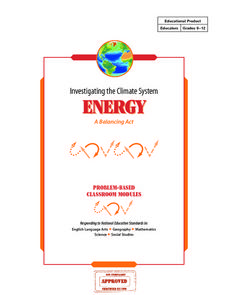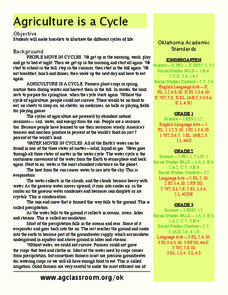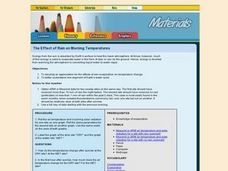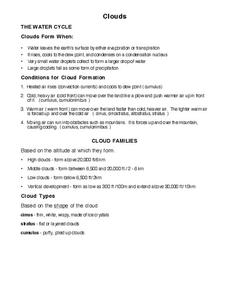Curated OER
Ride the Rock Cycle
Students identify the steps in the rock cycle. They complete a K-W-L chart before the lesson begins. They answer questions about the stages to complete the lesson.
Curated OER
Weather Jeopardy
Future meteorologists play a Jeopardy game to review vocabulary and concepts taught during a weather unit. Questions cover such topics as weather vocabulary, tornado safety, the water cycle, and cloud types are part of this review.
Curated OER
Investigating the Climate System: Energy, A Balancing Act
Earth science explorers design an experiment to demonstrate that the albedo of a surface affects its temperature. They test to find out if moisture on the surface affects temperature. They discover whether or not concrete or asphalt heat...
Curated OER
Agriculture is a Cycle
Students explore cycles in nature. In this cross curriculum agriculture lesson, students define "cycle" and research weather and planting folklore. Students make a bracelet in which individual colored beads represent the many "cycles" of...
Curated OER
Geography: Water, Water Everywhere
Young scholars discuss flooding and its causes. They view a Powerpoint presentation about floods and prevention methods. After creating a model with clay and pans, they investigate river behavior in various terrains with different...
American Chemical Society
Why Do Puddles Dry Up?
Bring evaporation right into the hands of young scientists with an entertaining, hands-on activity. Investigators view videos and images while participating in class dialogue focused on water evaporating from surfaces. A short experiment...
Curated OER
W Is for Water
Third graders gain appreciation of water by watching online video, "Weather Smart: The Water Cycle and Clouds," exploring how water cycle works, comparing and contrasting three states of water as solid, liquid, and gas, and discussing...
Curated OER
Air and Water in the Environment
Second graders participate in a three part lesson in which they identify and describe forms of moisture in the environment. Part one of the lesson involves the three stages of the water cycle, part two focuses on creating humidity by...
Virginia Department of Education
Weather Patterns and Seasonal Changes
Get your class outside to observe their surroundings with a lesson highlighting weather patterns and seasonal changes. First, learners take a weather walk to survey how the weather affects animals, people, plants, and trees during...
Curated OER
Water Cycle
Students answer short answer questions about the water cycle and other cycles. In this water cycle lesson plan, students explore clouds, rain, evaporation, and more.
Curated OER
Cloud and Weather Patterns
Fourth graders examine how weather patterns generally move from west to east across the United States, and how clouds are formed and are related to the water cycle. They view and discuss a PowerPoint presentation of the types of clouds,...
Curated OER
The Magic School Bus Dries Up
Students learn along with Ms. Frizzle's class. In this Magic School Bus lesson plan, students work in small groups to find out if foods they eat contain water.
Curated OER
Let's Look at the Clouds!
Students investigate the water cycle and cloud formations by examining photographs. In this weather lesson plan, students observe pictures of specific cloud types and identify them by putting them in groups. Students describe...
Curated OER
Regents High School Examination: Physical Setting Earth Science 2008
Throughout this earth science exam, high-school geologists complete a series of multiple choice and short answer questions about the solar system, atmosphere, and earth system. This is an amazing test, as are all of the exams developed...
Curated OER
Moist Air & Clouds
Fifth graders study the weather and water cycle of clouds. In this water cycle lesson, 5th graders read background information about evaporation, condensation, and the states of water.
Curated OER
Cloud Formation
Fifth graders discuss the weather and cloud formation. They rotate, in groups, through various activity stations set up in the room. Stations include activities such as researching types of clouds, drawing pictures of the water cycle,...
Curated OER
The Effect of Rain on Morning Temperatures
Eighth graders study the effects of the water cycle. They create a graph of the air temperature versus solar radiation on a rainy and clear 24 hour period using data from a provided link. Afterward, they answer questions to determine the...
Curated OER
Build A Model of the Water Cycle
Students identify and describe the steps in the water cycle. They discover the sun as the source of the cycle. They work together to create their own water cycle model.
Curated OER
Creating the Water Cycle
Pupils create a terrarium to examine the stages of the water cycle. In small groups, they plant and water a seed in an enclosed plastic container. Each day they diagram and write observations of the terrarium using water cycle vocabulary.
Curated OER
Defining Drought
High schoolers examine the hydrologic impacts of drought. They look at drought from a variety of prespectives. Students first focus on the scientific definition of drought, including weather patterns, water cycles, water requirements by...
Curated OER
Water: Naturally Cleaned
Learners use stream trays covered in different types of rocks or soil to investigate infiltrates and runoff. In this water pollution instructional activity, students work in groups with stream trays that have different substrates. They...
Curated OER
Clouds
In this science worksheet, students look for the meaning of the water cycle and its relation to the formation of clouds. They read the information about the different types of clouds.
Curated OER
A Model of the Rock Cycle
In this rock cycle worksheet, young scholars use different colored crayons to represent different types of rocks. They follow step by step procedures to model the rock cycle with the crayons. Students draw the rock cycle, show...
Curated OER
The Potential Consequences of Climate Variability and Change
Students analyze the impact of climate variability and change utilizing a broad span of topics over a wide range of grade levels. This three lesson plan unit is easily adapted for the various instructional levels listed.























